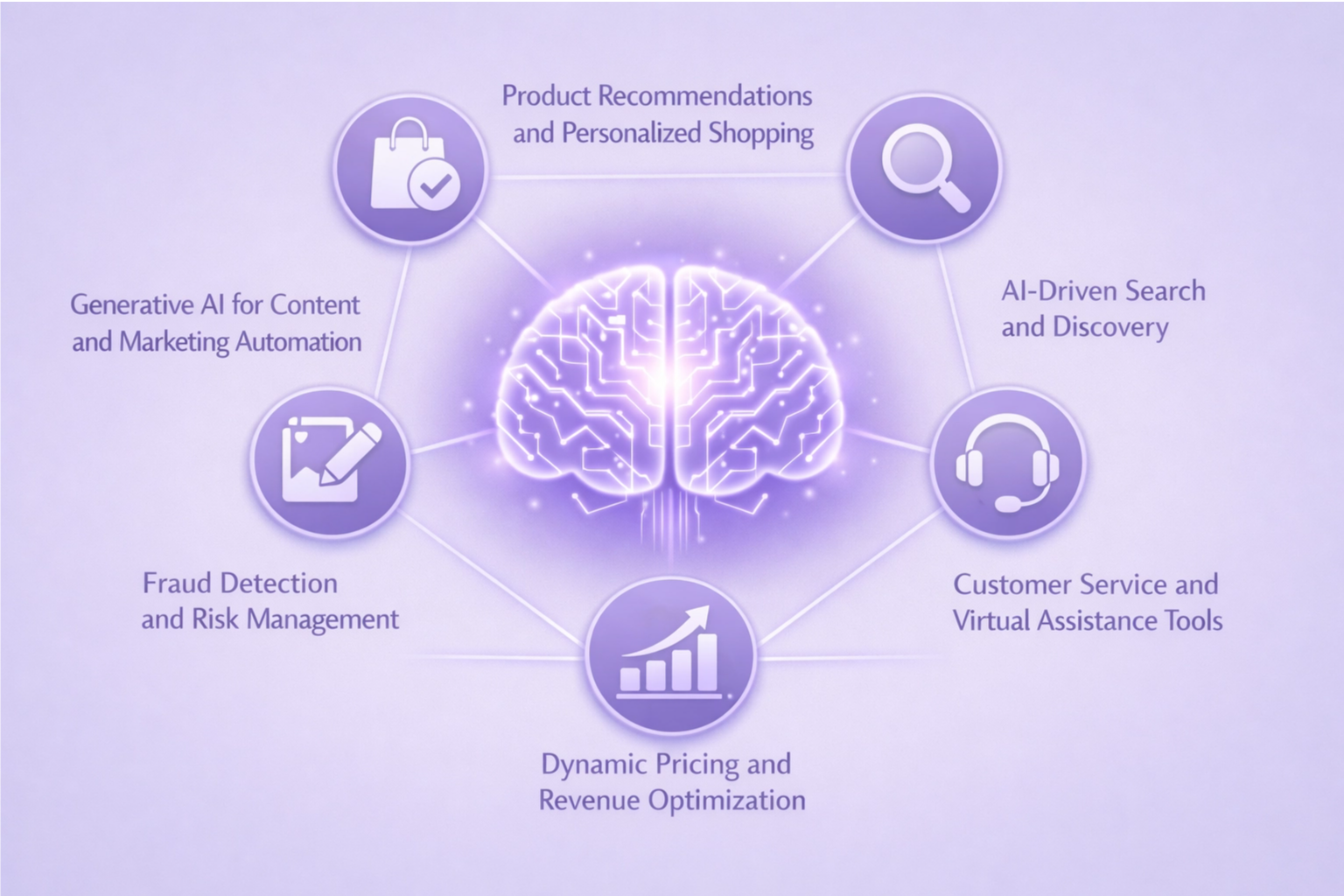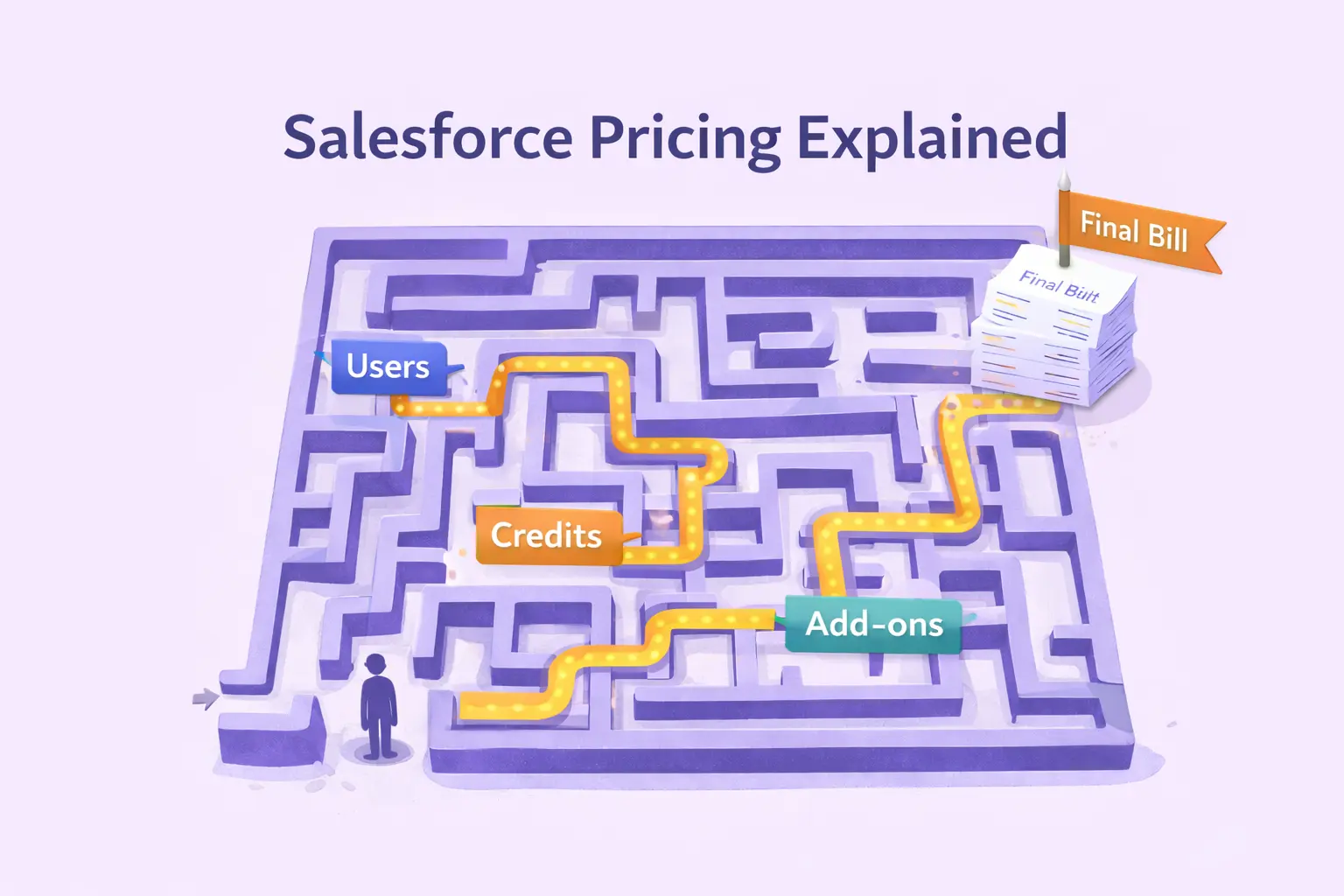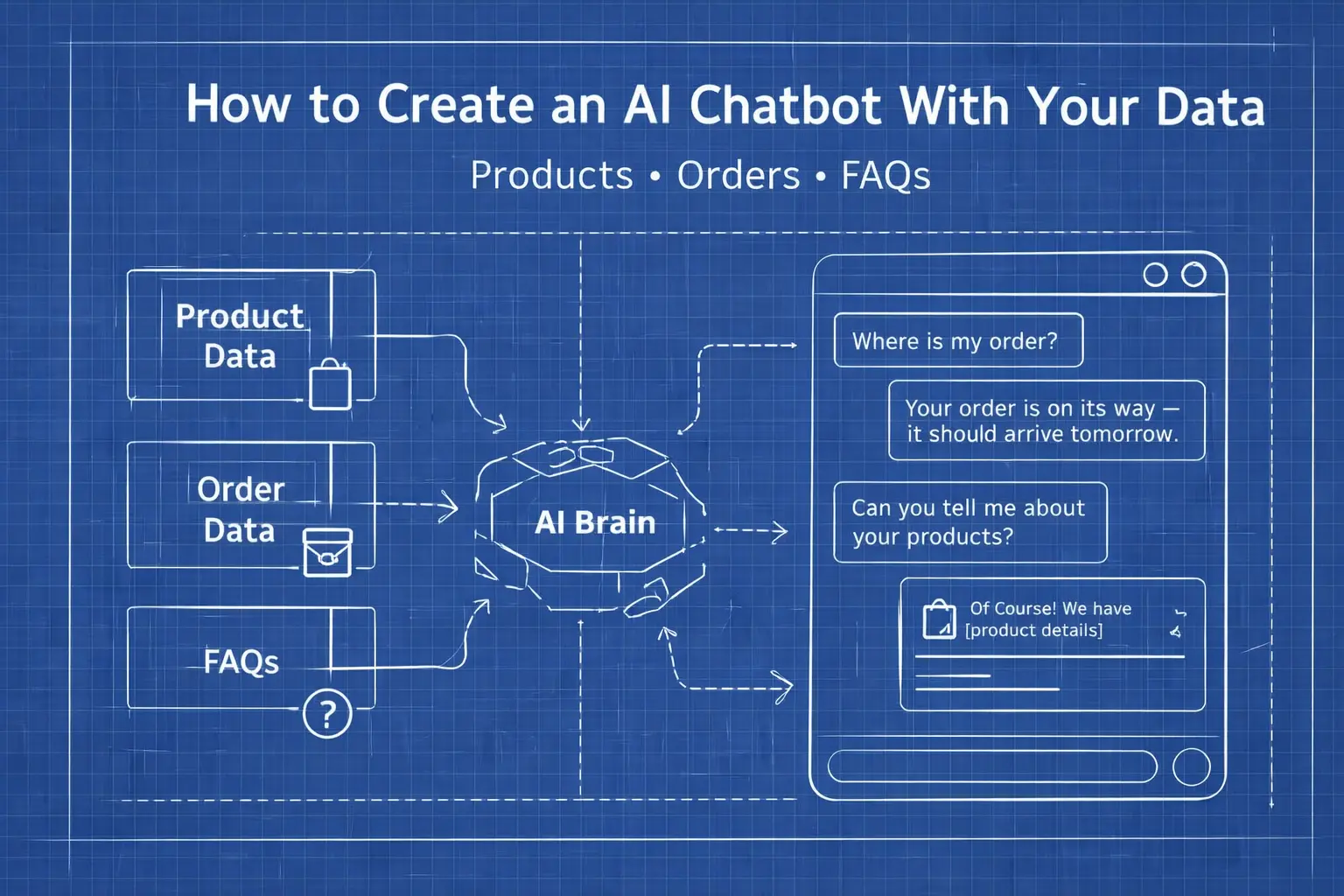25 Best E-commerce Integrations for Your Online Store + Key Benefits

Forbes has projected that by 2040, nearly 95% of all purchases will be conducted online or through digital channels. That’s a whole lot of people clicking “add to cart”!🛒
As online shopping grows, e-commerce businesses need to keep up. Providing a smooth buying experience isn’t just nice to have anymore; it’s essential. That means connecting your store with tools that handle everything, from customer service to payment processing and inventory management.
This is where e-commerce integrations come in. Powerful connections between your store and external software systems can help you automate workflows, improve efficiency, and increase customer satisfaction.
But what exactly are e-commerce integrations? And how do you choose the right ones to scale your business without unnecessary headaches? I will break that down in this article.👇
What does "E-commerce integration" even mean?
E-commerce integration is the process of connecting your online business to external applications or software. This includes your customer relationship management (CRM), accounting systems, shipping providers, and order management systems.
Think of it like giving your business superpowers. Instead of logging into 10 different tools or copying and pasting data manually, everything talks to each other automatically.
What are the key benefits of E-commerce integration?
So, how is integrating business platforms supposed to help you grow your business? With these 4 simple tricks.
1. Less work for everyone (including your customers)
No more jumping between tabs or doing the same task ten times. With integration, your systems talk to each other, automatically syncing data, orders, and customer details. Your team saves time on boring tasks, and your customers enjoy a better experience (like getting quick answers from a chatbot or tracking their order without emailing support).
2. Extra features on your online business
With the right integrations, you can add all kinds of advanced features. Imagine sending automated emails when someone abandons their cart, or showing real-time inventory availability from your warehouse without coding anything.
3. Keeping all the data synchronized
Every order, every customer detail, and every product update can be synced across platforms with just one click. This means no mismatched data, no human error, and no extra headaches!
4. Improving customer relationships
When everything's connected, you can offer a more personalized and responsive customer experience. For example, your CRM knows what your customer bought last time, and your chatbot can recommend what they might need next and answer inquiries. That’s how you build loyal customers.
Different types of E-commerce integrations + software recommendations
Now that we covered the "why?", it's time to understand the "how?". I will explain the different building blocks and software recommendations that (when properly connected) can make your business run like butter.🧈
Types of e-commerce integrations in short:

E-commerce platform - Storefront
- Shopify
- Woocommerce
- Magento
- Shoptet
- Amio
- Tidio
- ChatBase
- PayPal
- Stripe
- Adyen
Inventory management integration
- Zoho (inventory)
- InFlow
Order management and shipping integration
- Shippo
- OrderCup
- Luigi's box
- Algolia
- Mailchimp
- ConvertKit
Customer relationship management (CRM)
- HubSpot
- Salesforce
- Glew
- CrazyEgg
- HotJar
Tools to make it all make sense
- Zapier
- Make
Your E-commerce platform or "storefront":
This is basically your online platform, where customers browse and place orders. It's also the base for everything you will integrate later.
Our top choices include three big names and a strong local contender for the Czech/Slovak. While the powerful tools in each category offer powerful features, choosing local e-commerce integrations can have its perks; they often integrate with regional payment providers, logistics services, or language-specific tools.
Now, let’s dive into each of them individually.
Shopify

All-in-one platform, also the most loved by users!
Main features:
- easy drag-and-drop storefront creator.
- integrates with many other apps (including social media platforms).
- Built-in marketing tools.
- Integrated inventory management.
- ability to track payments.
Pricing:
- 3-day free trial (1€/month for 3 months after that)
- Paid plans from 19€-2300€/month
WooCommerce

Fully customizable platform based on WordPress.
Main features:
- Open-source software, so you can just add a WooCommerce plugin to your WordPress website.
- Built-in options include: shipping, payment, order management, and more...
- Extensions that allow you to add even more options, like shipment tracking and subscription features.
- Express payment methods like Apple Pay 🍎
Pricing:
- In short, installing WooCommerce on WordPress is free, BUT your costs will differ based on hosting services, security features, and domain.
Magento

A customizable and scalable platform by Adobe Commerce, probably best for medium-large e-commerce businesses.
Main features:
- Built-in tools aimed specifically at building customer loyalty
- Built-in tools for content management, order management, shipping, and marketing.
Pricing:
- Free plan (open source) available
- Paid plans from 2000€/month
Shoptet

This is an honorary local pick for Czech/Slovak e-commerce businesses.
Main features:
- Custom-made payment gateway.
- Many customization options to match your brand.
- Integration with the shipping company of your choice - for example, Packeta in the Czech Republic
- I know I said a "local choice", but you can also go global with different currencies and translations 🌎
Pricing:
- Free plan available
- Paid plans from 12€-150€/month
AI Chatbots/helpdesks:
To truly strengthen your relationship with customers and their loyalty, you should also have software that offers live chat, chatbots, a help desk, and so on. Let's take Shopify and Amio (our chatbot) as an example. By integrating the two platforms, you will get an overview of customers browsing your site, and you will be able to reach out to them. You can also keep track of all customer interactions without any tedious manual processes. You can integrate these tools on many e-commerce marketplaces like Shopify, WooCommerce, and more.
Amio

Another local pick is Amio, a GPT-4 AI chatbot that can automate up to 90% of your customer interactions.
Main features:
- Integrates with different e-commerce platforms, including Shopify and WooCommerce.
- Accessing order details for the checkout process, order tracking, and refunds.
- Integrating the product catalog for personalized product recommendations.
- Customizable chat widgets - will set your brand's tone of voice.
- Pre-defined answers for common customer inquiries - full control over the replies.
- Uses the latest GPT artificial intelligence to answer more complex queries.
- Real-time and top-down analytics give you a clear view of your chatbot’s overall impact, from big-picture performance to insights from individual conversion rates.
- Multilingual customer support for global e-commerce businesses.
Pricing:
- Request a demo, and/or start with a 14-day free trial.
- Paid plans from 150€-2950€/month
Tidio

NLP-based chatbot that can give the right product recommendations based on customer preferences.
Main features:
- Omnichannel communication
- 30+ pre-designed templates
- Supports 6 languages
Pricing:
- Free plan available
- 7-day free trial
- Paid plans from 29€-2999€/month
ChatBase

A GPT-4 AI assistant that will provide instant replies to your customers' questions.
Main features:
- Personalized answers based on memory - it remembers the logged-in users.
- Customizable chat widgets. Easy to set up and use.
- Integrates with many apps and services.
Pricing:
- Free plan available
- Paid plans from 40€-500€/month
Payment gateway integrations:
E-commerce business goes hand in hand with online payments. A payment gateway integration will ensure a secure and easy checkout process, and it can also be beneficial for accounting since it gives you centralized access to transaction data.
Paypal

I think everyone has already heard about PayPal, but let's go over it in detail, just in case someone hasn't.
Main features:
- Integrates with many different e-commerce platforms and accounting software.
- Easy and quick payments using QR codes.
- Accounting system to manage your billing, inventory, invoices, taxes, and more.
- Provides financial reports of your accounts.
Pricing:
- Customize pricing
Stripe

Perhaps one of the most widely used payment integrations, which is also Shopify's native payment processor.
Main features:
- Virtual and physical card issuing systems.
- Automatic invoice creation and sending immediately to online buyers.
- Automated tax calculator.
Pricing:
- Starting at 2.9% per successful transaction
- Customize pricing
Adyen

A scalable and global payment platform that connects to many e-commerce platforms and works across online, in-store, and app payments.
Main features:
- A single platform that unifies online and offline payments
- Supports various payment methods, including major credit cards, digital wallets, and local payment options
- Built-in data analytics tools
Pricing:
- A fixed processing fee of 0.11€ + a fee determined by the processing method
Inventory management integrations:
Keeping track of stock manually is a recipe for overselling or running out at the worst possible time. Inventory integrations connect your store with your warehouse or inventory system, so inventory levels update automatically when someone makes a purchase. You’ll know what’s in stock, what’s running low, and when to reorder (without a million spreadsheets).
Zoho Inventory

(Among other things) Zoho is a cloud-based inventory management system that can integrate with 500+ third-party services.
Main features:
- Automate invoices, inventory, and orders.
- Options for item grouping and bundling.
- Takes care of packaging, shipping, and post-shipment tracking.
Pricing:
- 29€-249€/month
InFlow

InFlow inventory is probably one of the best options for a smaller e-commerce business, with an intuitive and user-friendly setup.
Main features:
- QR code scanning for quick inventory records.
- Integrates with many e-commerce platforms.
- Customizable reports and analytics for the most valuable insights.
Pricing:
- 14-day free trial available.
- Paid plans from 130€-700€/month
Order management & shipping integrations:
Once someone hits "buy," the real work begins: confirming orders, processing returns, and sending shipping updates. Integrating your store with an order management system (OMS) and your shipping providers helps automate this entire journey, so you have satisfied customers and your team avoids messy logistics.
Shippo

One of the best e-commerce shipping integrations (in my humble opinion😌) with everything you might need.
Main features:
- Syncing your orders with their tracking information.
- Best discounts for USPS, DHL, and other shipping options.
- Shipping analytics that will provide actionable insight.
- Personalized shipping labels that will match your brand.
Pricing:
- Free plan available
- Paid plans from 16€/month
- Customize pricing for bigger shops
OrderCup

Ordercup helps you with not only shipping globally but also order management.
Main features:
- Integrates with many e-commerce platforms.
- Works with carriers globally.
- Shipping discounts with USPS, DHL, etc.
Pricing:
- Paid plans from 25€-170€/month
Search Tool integration
Integrating search tools instead of relying on the built-in search features can help customers find products faster with personalized results.
Luigi's box

Another local pick that integrates with many e-commerce platforms, including Shopify and Magento.
Main features:
- Intelligent search that handles typos, synonyms, and grammatical mistakes
- Personalized product recommendations
- Ranking and ordering products based on relevancy and profit margin
Pricing:
- Customize pricing
Algolia

Creating fast and relevant search experiences across websites and apps.
Main features:
- AI machine learning to improve search quality over time
- Typo tolerance and predictive search
- Multi-platform integration
Pricing:
- Free plan available
- Customize pricing
Email marketing integrations:
Email is still one of the most effective channels for e-commerce. Integrating these tools lets you automate product recommendations, cart abandonment emails, and post-purchase follow-ups, all of which can be personalized using data pulled directly from your store. You can also build email lists, send automated email campaigns, and plenty more.
So, while social media marketing is taking over, you can not underestimate the power of email marketing tools.
Mailchimp

Not only an email platform, but also used for marketing and automation.
Main features:
- Pre-made email templates.
- Customizable for your brands.
- Customer data management tool to understand your audience better.
- Customer journey builder: Create automation workflows based on your customers' common traits.
- Send reminder emails for abandoned cart recovery.
- Built-in targeting tools to help you get the right audience.
Pricing:
- 14-day free trial available
- Customize pricing
ConvertKit

Another sales and email marketing software that will help you grow your email list with sign-up forms.
Main features:
- Targeted emails based on customer behavior.
- Email automation for personalized emails.
- Over 100 automated E-commerce integrations.
Pricing:
- Free plan available
- 14-day free trial
- Pai plans from 25€-2000€/month
CRM integrations:
This will help analyze and manage customer data and interactions. In turn, you can understand the clients better for marketing and customer strategies.
Hubspot

All-in-one CRM platform that connects your customers, teams, and database all in one place.
Main features:
- Built-in features that help you with the sales process, marketing, and customer service.
- Customer feedback collection surveys.
- Data synchronization.
Pricing:
- Free plan available
- Paid plans from 15€-3300€/month
SalesForce

Connect your marketing, sales, IT, and service teams in one place and get a shared view of your customers' needs.
Main features:
- Insights from social media platforms.
- Automation of day-to-day tasks.
- Reach the right audience through their preferred channel.
Pricing:
- Customize pricing
Analytics integration:
Let's say you did all those automation above, you still need some tools that can give you insights into your customer behavior and sales trends.
Glew.io

Glew provides extensive data insights to help e-commerce businesses grow, with over 200 key performance indicators (KPIs)
Main features:
- Tracks and analyzes performance across sales channels.
- Pulls data from your inventory records to analyze product performance.
- Measures the effectiveness of marketing campaigns.
Pricing:
- Free plan available
- Customize pricing
Crazy egg

This will help you understand how visitors are interacting with your online marketplace or website.
Main features:
- visualizing where users click and how far they scroll.
- You can test different versions of a page to see which performs better.
- Provides interaction data for each element on your website.
- Actively collect direct feedback from visitors.
Pricing:
- 30-day free trial
- 25€-500€/month
Hotjar

Hotjar uses visual maps to provide feedback on user behavior.
Main features:
- Using "heatstamps" to show where users click or scroll.
- Recordings of user interactions.
Pricing:
- Free plan available
- Paid plans from 40€-200€/month
Making everything easier:
It might seem like a lot to be integrating all these tools. And even if you use all types of automation, your employees still need to be on top of all the information. Hence, my final recommendations.
Zapier

Zapier integrates with thousands of apps and helps automate common workflows while updating the info in Slack, Google Sheets, or wherever your team keeps data.
Main features:
- Connect your different platforms - For example, if you sell on Shopify and eBay
- Automatically add every customer to your mailing list.
- Pre-made templates to get you started.
Pricing:
- Free plan available
- Paid plans from 20€-69€/month
- Customize pricing for bigger shops
Make

Another local pick for Czechs/Slovaks. This is a no-code e-commerce automation tool that is known for its visually intuitive automation.
Main features:
- Connect different apps and services and let the data move between them automatically.
- Mind map format - you can visualize how all your apps connect.
- Drag-and-drop features + customizable templates.
- Integrates with thousands of apps and services.
Pricing:
- Free plan available
- Paid plans from 9€-29€/month
- Customize pricing for bigger shops
Conclusion
The e-commerce industry grew a bit in the time it took you to read this article 😜, and if you are new to this industry, the e-commerce integration tools will be game changers for you.
Whether you need help with product information management, accurate inventory management, or just general business processes, there is a wide range of tools out there for you.
Many of these suggestions can work across two or more categories, so choose effectively based on your business goals!
And feel free to reach out, we are here to help regardless of what custom integration you need ✌️
Book a 30-minute session where we will find out how AI bot can help you decrease call center costs, increase online conversion, and improve customer experience.
Book a demo



